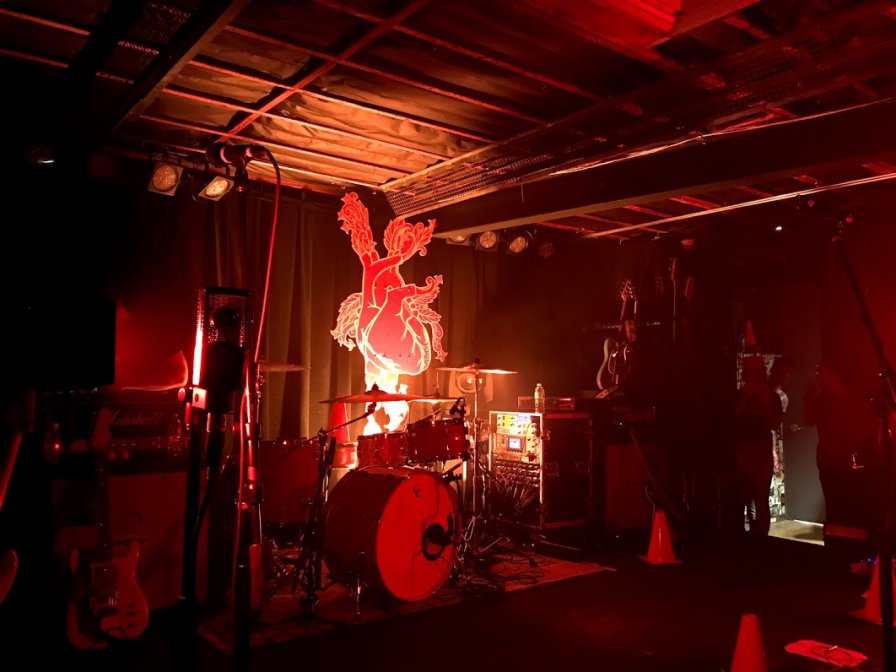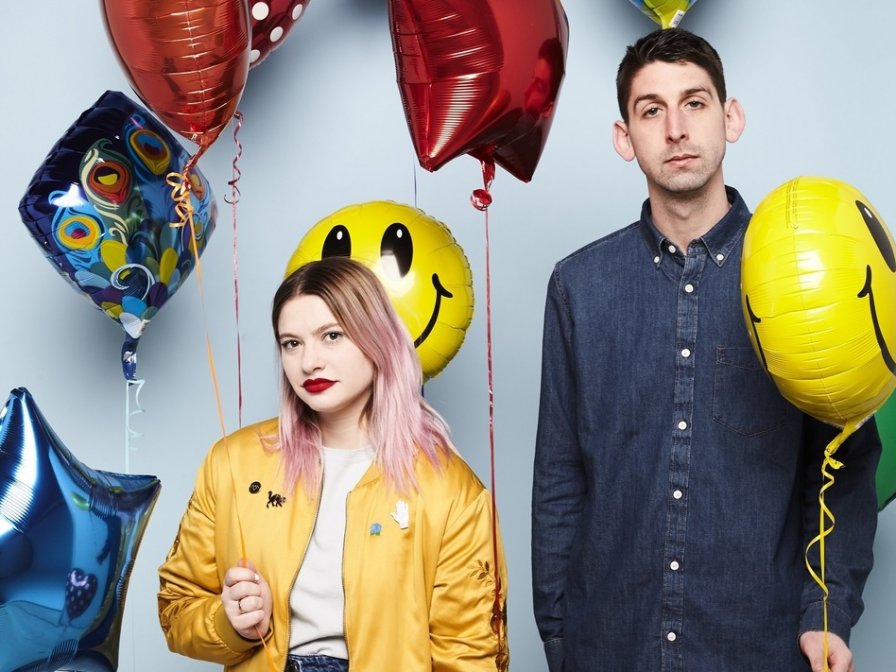A lot can happen over the course of 10 years. For Scranton, PA-based band Tigers Jaw, 10 years has passed since the release of their self-titled album. In that time, they have seen growth and changes in their music, as heard on the three albums they’ve since released, the most recently being 2017’s Spin. But what hasn’t changed is the special fondness that their fans, and the band itself, feel for the self-titled release from 2008. For long-time Tigers Jaw listeners, the self-titled 10-year anniversary tour last year was a chance to hear fan favorites that have stuck with them over the years, like the comfort of coming home after being away for so long.
I talked with Ben Walsh of Tigers Jaw about the album turning 10, the past and future for Tigers Jaw, Twin Peaks, and what inspires him to keep making music.
What are your feelings about your self-titled album turning 10?
First and foremost, it definitely makes me feel old [laughs], but not necessarily in a bad way. I feel very lucky that we’re still able to tour, still able to put out new music. But also that people still feel connected to stuff that’s that old, and it’s interesting playing songs that we wrote and worked on when we were young teenagers and viewing them a little differently now but still getting something genuine out of them.
How would you describe how your sound has changed over the last 10 years?
When we were doing that record, there were no preconceived notions about what was supposed to happen or what a song should have or shouldn’t have, so there was just less planning, less thought put into it. It was more spontaneous, just more raw I think. Over the years, you listen to a wider range of influences and anything can be inspiration, like new pedals or a new guitar or playing around with different people. You just pick up on lots of different styles and lots of different nuances that make their way into your songwriting as you go.
So thinking about that, then, how do you think you’ve grown as musicians since your self-titled?
I think we’re definitely a lot more skilled at actually playing our instruments, and I think there’s something special about how raw the first record is and how raw the lyrics are. I think I definitely second-guess myself a lot more as an almost-30-year-old than as an almost-20-year-old, so that’s maybe an unfortunate side-effect of getting older and wanting to keep progressing. Sometimes I have to remind myself to just take a step back and let it happen in a genuine way. When I think about how the songs on the self-titled came about, they really came about in that sort of genuine way. I always try to channel that.
Thinking back to the self-titled then, what were your main inspirations when you were writing that album?
It’s interesting because some of the bands that we wanted to sound like… I started the band in 2005 with Adam McIlwee and we were listening to a lot of weird indie rock like The Microphones and The Unicorns and some local bands called The Swims and Okay Paddy, and none of them sound anything like Tigers Jaw. But I think we were writing songs, and at the capacity that we were able to perform those songs, they sort of sounded the way Tigers Jaw sounded. So, we were trying to do this thing that we had no idea how to do, and it ended up sounding completely different and unique to ourselves.

What’s the story behind the cover art for the [self-titled] album?
Initially, Brianna [Collins] made the heart artwork. When she was in high school, she was in a lot of art classes, and she would use that time to print t-shirts and print posters for us and not do her actual work [laughs]. She drew that heart and we used that as the screenprint for the first release of it, which was a CD-R on a Scranton label called Prison Jazz. And then again, when Photobooth Records released the first vinyl release, we used the heart design. Once we started working with Run For Cover, we wanted to do something a little bit different, so all of us were just kind of walking around Scranton, and Brianna had her camera with her and was just taking a bunch of pictures of us throughout the day. A lot of those pictures ended up being at a place called Buona Pizza. It’s a place in downtown Scranton where we always hung out after practices or after shows. It’s just a really great pizza spot, and it’s just kind of our home base where we hung out and would eat after shows, so we ended up using that shot of the pizza for our Run For Cover art. We did a deluxe version [of the album] for this tour that integrates both artworks together, so we’re pretty pumped on how that came out.
I know that Twin Peaks has been an inspiration for you. How would you say its impacted you as a band or with your music?
I think that when you write songs about relationships, you can pull from your own relationships only so much and then you want to start thinking outside the box. There’s so many crazy, intertwining relationships in Twin Peaks and so many sideways sort of stories, and it just makes you really think in ways that you wouldn’t normally think. There’s a lot of these themes of duality and things that creep into the songwriting. Some of the references are very direct, some of them are not so subtle [laughs], but it’s just a really interesting show and you sort of get absorbed into its world. Sometimes it’s fun to try to write based on what you think the experience of a character might be, and that goes for other things too, not just Twin Peaks, but that’s definitely been the most interesting one to try to step into that world.
I had to ask [laughs] — Twin Peaks is like my life so…[laughs]
I see that necklace [laughs]
I had to ask the Twin Peaks question!
[laughs] No, I love it!
Back to the self-titled album. It has endured and remained a favorite for a lot of your listeners over the years; why do you think that is?
I think there’s just a genuine rawness to it that people connect with. The lyrics are very straightforward, very honest and I wouldn’t say broad, but they’re definitely relatable. You can kind of see yourself in them; anyone whose gone through any sort of relationship that maybe ended badly or you’re maybe yearning for someone or just all the things you think about when you’re a 16-year-old kid.
Thinking about the present, what inspires you now to keep making music?
I love to travel, I love to write songs, I love to tour, I love recording. Songwriting’s not ever been anything that’s been easy for me, and it takes me a really long time to write, so I always try to constantly just collect little ideas and little inspirations I have. All of my closest friendships have come out of this band, all of my coolest life experiences have come directly or indirectly out of this band, and I love performing and progressing and writing, so it’s just an endless cycle of inspiration to keep doing it as long as we can. As long as it still feels genuine, as long as it still feels fulfilling and fun we’re going to keep doing it.

What has been your favorite album that you’ve made over the years?
Well, I’m definitely biased, but I’m maybe most proud of our most recent, Spin, just because it was a departure from some of the previous material, and it was an opportunity for Brianna to step up in a really big way and write a lot of songs. It just was a really fun, creative experience recording that way. We did it song-by-song instead of instrument-by-instrument, so it allowed us to really focus in on the song and the structure and the lyrics and all the guitar tones, and it just really made each song exactly how we envisioned it being. It was a really fun process, and I think there are a lot of different-sounding songs. Maybe because it was the most recent album, but I really am just super proud of it.
It’s an awesome album! So, tell me why you decided to do the ten-year anniversary tour for the self-titled.
I think it’s been pretty clear that that album means a lot to us and to a lot of people. You kind of go back and forth, because a lot of bands are doing reunions or anniversary tours that sort of seem like cash grabs, but we thought about it a lot and first of all how fun it would be. There’s a couple of these songs that we haven’t played in years and years, and we’ve never played an album front to finish; people connect to these songs, and we thought it would be a fun way to just play this record for listeners that maybe are kinda stuck on that one and haven’t really listened to stuff after that. Then if they come to these shows, they’re seeing two different sets. They’re seeing a set of newer material and a set of the self-titled record, and maybe they see that that same sort of energy and that same sort of spirit has carried through from 2005 till infinity.
Where do you see Tigers Jaw going in the future musically?
Well, I think it’s going to be fun writing for this next record because with Spin, it was just Brianna and I, and we’re sort of bringing the band, at least the writing brain of the band, back to kind of how the band started, because the songs for the self-titled were written just by myself and Adam. So when we were doing Spin, we wanted to channel the same thing with just Brianna and I. For this next one, we’ve sort of rounded out the lineup again, so I think the writing process is going to be a little bit more different, some more voices, more ideas, some different styles from Luke and Teddy and Colin, so I think it’ll be really fun.
Lastly, what effect do you hope your music has on the people who listen to it?
I think that some people say a lot that our songs are really sad, and that it can bum them out, but I think that the more prevailing and the nicer thing to hear is when people say they can relate to it and that it’s gotten them through a lot of difficult times, because music is our outlet for everything — for depression, for everything. Touring life is really like…it can be really isolating, really difficult, and you sort of crash when you’re home. And then when you’re home, you wanna be on tour and vice versa. So it’s really a tough lifestyle, and music is what gets us through that and keeps us going. And when we meet people at shows and they say similar things like, “your music got me through this difficult time,” it really brings it around full-circle and it means a lot to us. I love getting to connect to listeners in that way and kind of share experiences like that.
More about: Tigers Jaw
